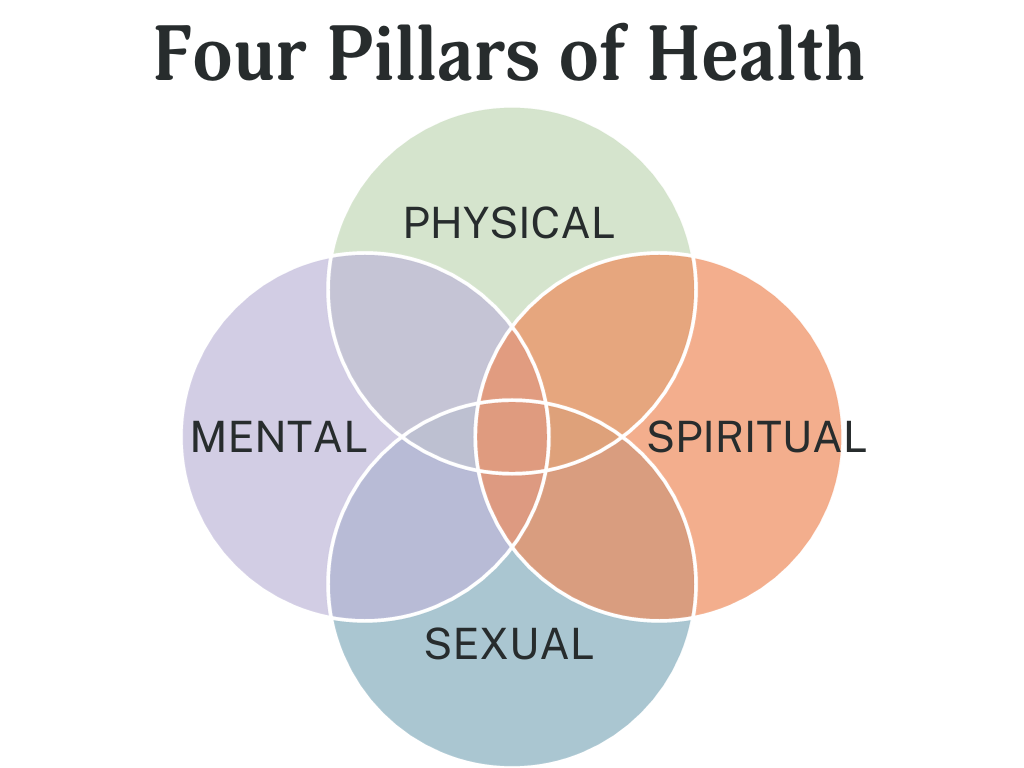Your Body, Your Rules: Unraveling Sexual Health
Sexual Health is one of the four pillars of health: Physical, Mental, Spiritual and Sexual. As a holistic healthcare provider, I believe that all of these pillars are a vital part of wellness.
The widely-adopted definition of sexual health developed by the World Health Organization is expansive. It includes concepts such as the absence of disease and coercion, and draws attention to sexual rights and to the possibility of sexual pleasure. Sexual health can involve wellness exams, annual gynecology exams and pap smears and breast exams and ruling out conditions that cause sexual pain and dysfunction.
The Four Pillars of Health: Physical, Spiritual, Mental and Sexual
Do you have a provider that supports your sexual health?
Sexual concerns can involve single or multiple parts of the urinary, reproductive, muscular, and nervous system and include treating your mental health. Sometimes treating sexual health concerns can involve one provider, but many specialties frequently work together to treat sexual health conditions. Referrals and communication between Nurse Practitioners, Doctors and Physical Therapists and Mental Health Providers in Gynecology, Urology, Sexual Medicine and Mental Health can improve outcomes. Andrea Phillips ARNP, CNM has completed additional training beyond what NPs and MDs cover in medical programs in residencies through the International Society for the Study of Women's Sexual Health (ISSWSH) and the North American Menopause Society (NAMS).Providers that seek additional training through ISSWSH and NAMS is one way for providers to demonstrate their dedication to continuing education for patients with sexual pain and menopause. ISSWSH providers are experts on evaluation, diagnosis, and treatment of sexual pain in women or any patients suffering with vulvovaginal and pelvic pain, and NAMS providers are specialists in menopause and the midlife transition where many of these conditions appear.
Common Problems are
Clitorodynia
Vulvodynia
Genitourinary Syndrome of Menopause (GSM)
Interstitial Cystitis/Urethritis
Dyspareunia
Vulvovaginal and Vulvar Dermatoses
Persistent Genital Arousal Disorder (PGAD)
Conception or Pregnancy/Post-Partum Pain
Recurrent/Resistant Vaginitis
Urinary incontinence
Urinary tract infections
Pain or dryness with sex
Orgasmic dysfunction
Menopause symptoms
Decreased arousal or interest in sex
Endometriosis and other Gynecological Causes of Pelvic Pain
What is sexual dysfunction?
Sexual dysfunction means that you either can’t have sexual intercourse or that there’s an underlying problem that interferes with your ability to enjoy sex. More specifically, sexual dysfunction is defined as having persistent and recurrent problems with:
Sexual desire: low sex drive that changes from your baseline, or distresses you
Painful intercourse: sexual stimulation and vaginal contact are painful with or without penetration
Sexual arousal: you can’t become aroused or maintain arousal, or your body doesn’t respond to arousal
Orgasmic disorder: you have difficulty reaching orgasm with and without sexual partners
In many cases, the underlying cause for these problems is a physical condition that can be treated and diagnosed.
What causes sexual health problems?
Sexual health problems can have many causes. Too many for one blog article. Seeing a sexual medicine or women’s health provider is the first step!
Gynecological diseases, urological problems, medication side effects and hormonal changes at menopause contribute to your sexual health. Numerous chronic conditions also have an effect, especially those that cause chronic pain. Even untreated blood sugar concerns and blood pressure can impact your sexual health and ability to enjoy intercourse and your sexuality.
When patients establish at Spectrum for sexual health, they’ve often been told that sexual pain or vaginal pain is all mental! That makes me mental!
With so many potential issues, it’s important to know that your provider has expertise in sexual health and is invested in your sexual wellness. If you establish at Spectrum Reproductive Health and Gender Affirming Care, you can be sure that Andrea Phillips ARNP, CNM is going to take the time to listen to your concerns, then work with you to get to the underlying cause and develop an individualized treatment.
BUT WHAT IF EVERYTHING IS FINE?
That’s excellent! If you have a vulva, you should still have a gynecological health provider as a part of your healthcare team! Annual exams are the right time to discuss preventative screenings and habits to keep you feeling healthy.
The frequency of gynecological wellness exams can vary depending on age, medical history, and individual health needs. Generally, it is recommended that women or anyone with a vulva visit their gynecological provider at least once per year.
It's important to talk with your healthcare provider or gynecologist to determine how often you should have a gynecological wellness exam based on your individual health needs and risk factors.
If you’d like to establish with an affirming sexual medicine and menopause provider, schedule below!
RESOURCES
Sexual Health Advocacy Group Providers of Bellingham
WHO: Defining Sexual Health. https://www.who.int/reproductivehealth/topics/sexual_health/sh_definitions/en/

